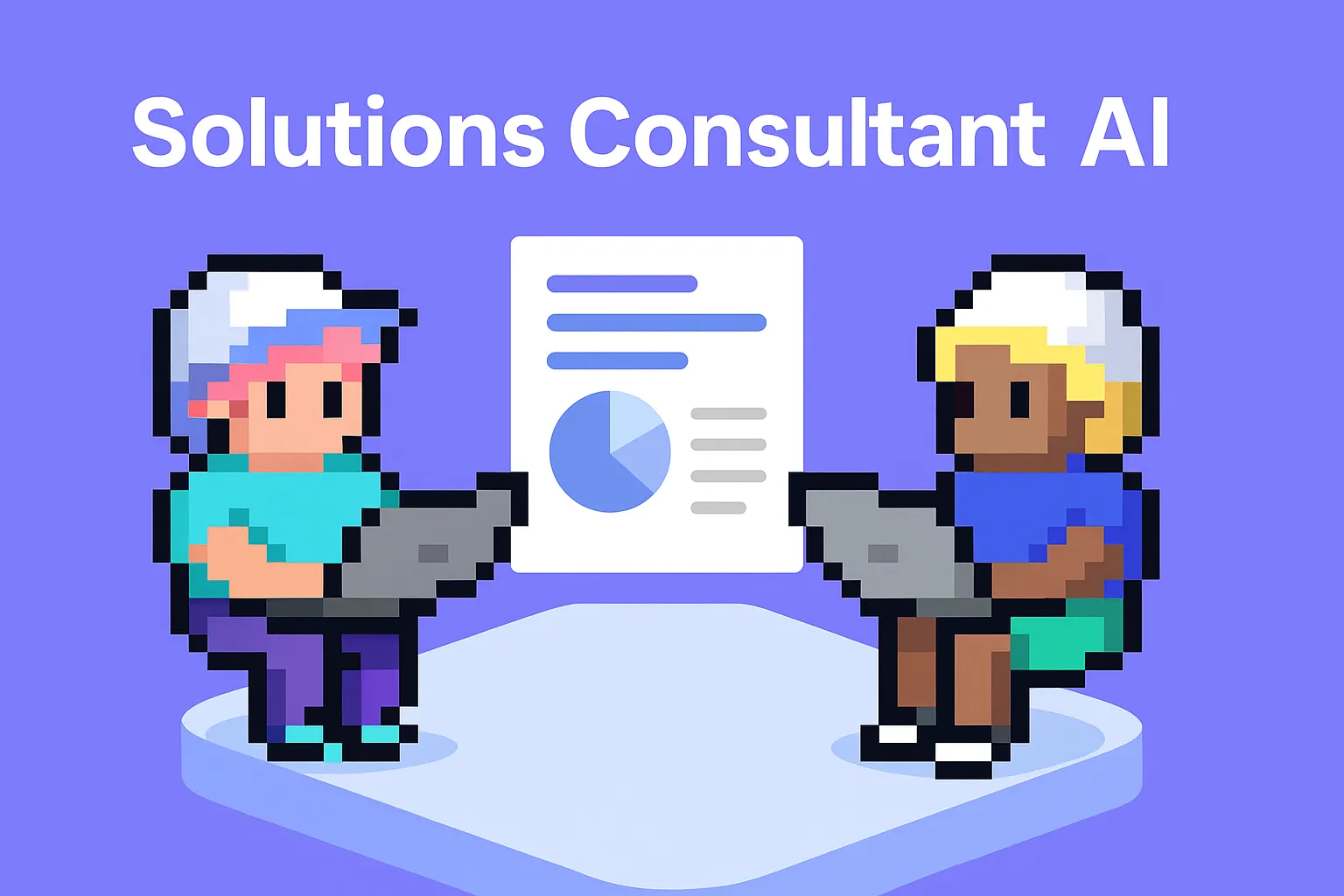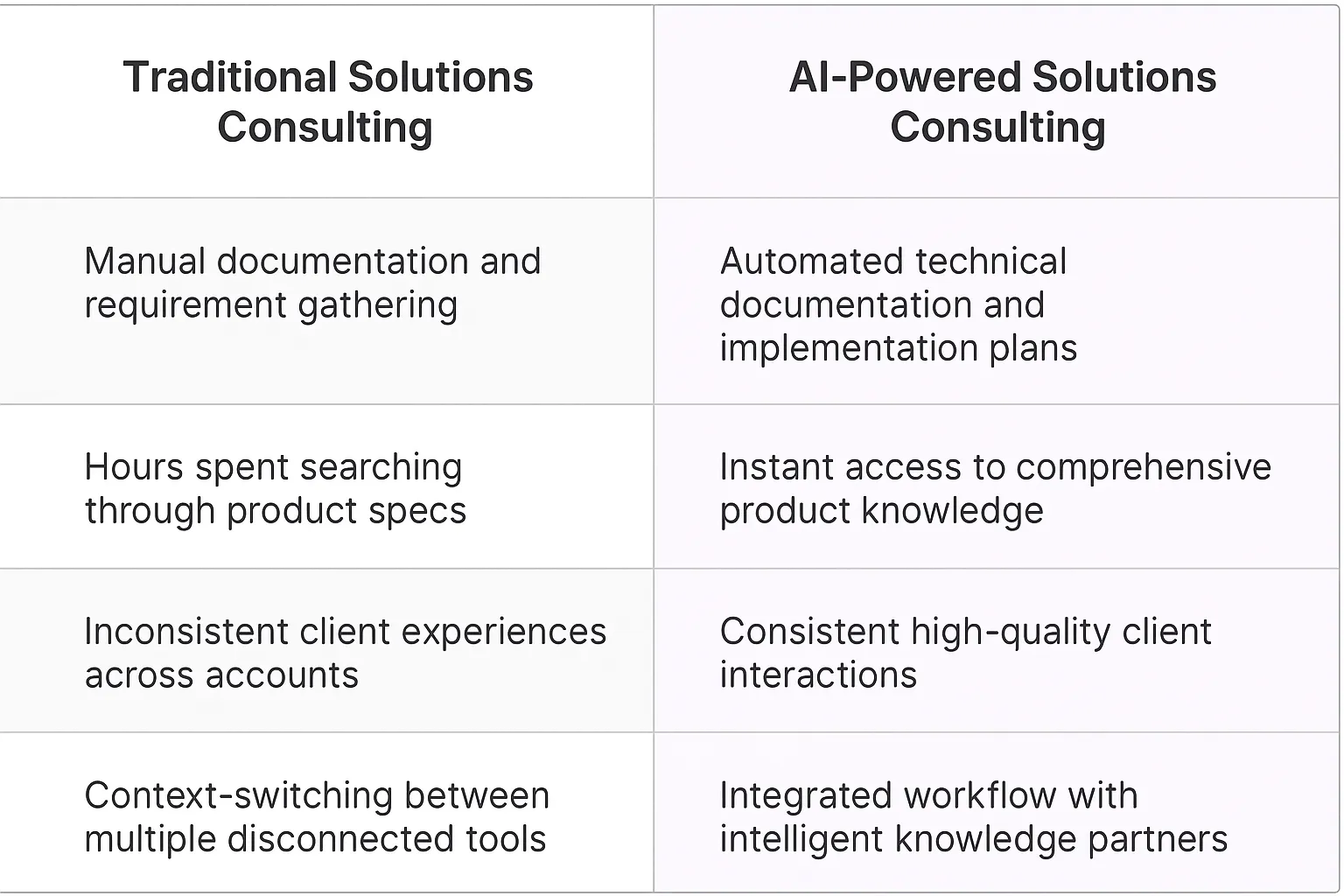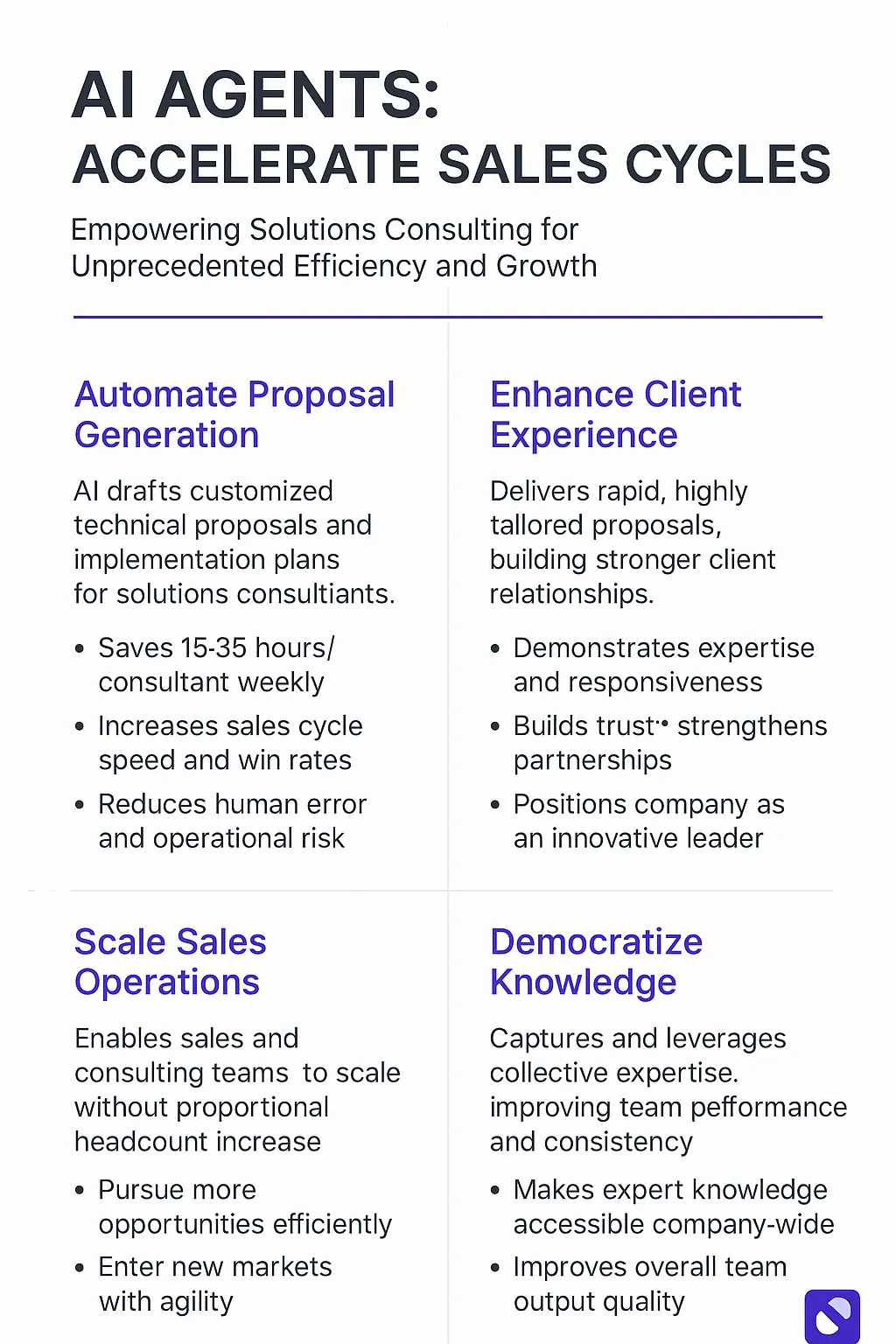Solutions Consultant AI represents a new breed of digital teammates specifically designed to augment technical sales and consulting professionals. These AI agents combine deep product knowledge, technical expertise, and pattern recognition capabilities to help consultants deliver more value to clients. They operate as knowledge partners that can instantly access and apply vast amounts of technical information, past implementation data, and best practices.

Solutions consultants traditionally relied on a complex web of disconnected tools and manual processes. They'd spend hours digging through documentation, crafting custom demos, building POCs, and managing technical requirements in spreadsheets. The reality was a lot of context-switching between Salesforce, product docs, presentation tools, and email threads - with valuable insights often getting lost in the shuffle.
The old workflow meant consultants had to be walking encyclopedias of product knowledge while simultaneously managing multiple client relationships. This cognitive load led to slower response times and inconsistent experiences across different accounts.
Digital teammates fundamentally transform how solutions consultants operate by acting as always-on knowledge partners. They can instantly surface relevant case studies, technical specifications, and integration requirements that would typically take hours to compile manually.
The network effects are particularly fascinating here - as more consultants interact with these AI agents, the knowledge base becomes increasingly sophisticated and nuanced. We're seeing consultants leverage AI agents to:
What's particularly compelling is how AI agents handle the heavy lifting of information processing, letting consultants focus on high-value activities like relationship building and strategic planning. The productivity gains aren't just incremental - we're seeing 3-4x improvements in response times and solution accuracy.
The most successful implementations I've observed are where AI agents become invisible members of the consulting team, augmenting human expertise rather than replacing it. This creates a powerful flywheel effect: better client outcomes lead to stronger relationships, which generate more data for the AI to learn from, ultimately delivering even better results.

The most interesting aspect of Solutions Consulting AI agents isn't just their ability to handle individual tasks - it's their capacity to create compound learning effects across the entire sales engineering process. Each customer interaction builds upon previous ones, creating an exponentially growing knowledge base of technical solutions, integration patterns, and industry-specific implementations.
These digital teammates excel at pattern recognition across hundreds of customer deployments, identifying common technical challenges and proven solutions that human solutions consultants might take years to discover. They're particularly effective at what I call "technical translation" - taking complex technical concepts and reshaping them into clear, compelling narratives that resonate with different stakeholder personas.
The real power emerges when these AI agents operate as part of a broader solutions consulting team. They can instantly surface relevant case studies, technical documentation, and implementation approaches from past successes, allowing human solutions consultants to focus on high-value activities like building strategic relationships and architecting novel solutions for unique customer challenges.
This creates a powerful flywheel effect: each successful implementation enriches the AI's knowledge base, making subsequent deployments more efficient and effective. It's a classic example of increasing returns at scale - the kind of dynamic that creates lasting competitive advantages in enterprise software.

Solutions Consultants face intense pressure to deliver strategic value while juggling multiple client relationships and technical requirements. AI agents are transforming how these professionals operate, creating leverage at key points in the consulting lifecycle. The depth and breadth of what AI can handle - from technical documentation to client communications - makes it particularly impactful for Solutions Consultants who need to maintain high-touch relationships while diving deep into technical specifics.
The most successful Solutions Consultants are already integrating AI agents into their daily workflow, using them as force multipliers for both client-facing and internal activities. These digital teammates excel at tasks that previously consumed hours of consultant bandwidth - like generating detailed technical specifications, analyzing client requirements, and preparing customized solution recommendations.
Looking at specific industry applications, we're seeing Solutions Consultants leverage AI in ways that fundamentally change their capacity to serve clients effectively. The following use cases demonstrate how AI agents are becoming indispensable partners in delivering exceptional consulting outcomes.
Manufacturing equipment sales teams face a classic scaling problem - they need deep technical expertise to properly scope and quote complex machinery, but can't clone their best solutions consultants. I've seen this bottleneck firsthand visiting factories across Asia.
A Solutions Consultant AI Agent transforms this dynamic by functioning as a technical knowledge hub for the entire sales organization. The agent ingests detailed product specifications, engineering requirements, and years of successful implementation data to provide precise technical guidance.
When a sales rep in Munich needs to quote a custom robotics cell at 2 AM their time (while the US team is asleep), the agent steps in. It analyzes the customer's production requirements, validates technical compatibility, and generates detailed specifications - all while maintaining the high standards set by veteran solutions architects.
The most fascinating aspect is how these agents learn from each interaction. Every successful implementation adds to their knowledge base. They begin recognizing patterns in customer requirements that even experienced consultants might miss. For example, one manufacturing client discovered their agent started proactively suggesting auxiliary equipment additions based on correlations in historical order data.
But the real power move isn't replacing solutions consultants - it's amplifying them. The agents handle routine technical validation and documentation, freeing up human experts to focus on complex edge cases and building strategic customer relationships. One global manufacturer saw their solutions team's capacity increase by 4x while maintaining 99.2% quote accuracy.
This isn't just about efficiency - it's about capturing and operationalizing institutional knowledge that typically lives in the heads of veteran employees. When your best solutions consultant retires after 30 years, their expertise doesn't walk out the door - it lives on in the AI agent, ready to guide the next generation.
I've spent time with dozens of healthcare technology sales teams, and there's a persistent challenge that keeps surfacing: the sheer complexity of selling enterprise clinical systems. The knowledge required spans everything from HL7 interfaces to HIPAA compliance to clinical workflows - it's mind-boggling.
Solutions Consultant AI Agents are becoming game-changers in this space. Take what happened at a major EMR vendor I advise - they deployed an agent that absorbed their entire technical documentation library, implementation playbooks, and 15 years of successful deployment patterns. The depth of knowledge is staggering.
When a sales rep needs to scope out a cardiology department integration at 11 PM before tomorrow's meeting, the agent delivers. It maps out technical dependencies, flags potential integration challenges with legacy systems, and builds detailed implementation timelines that account for clinical workflow disruption minimization.
What's particularly fascinating is the network effect at play. Each successful implementation feeds back into the agent's knowledge base. One healthcare client discovered their agent started identifying cross-department integration opportunities that even their veteran consultants hadn't considered - like how the cardiology PACS system could enhance ED workflow efficiency.
The most successful deployments don't position these agents as replacements for solutions consultants. Instead, they act as knowledge multipliers. While the agent handles technical feasibility assessments and documentation, human experts can focus on strategic planning and building trust with clinical stakeholders. A leading healthcare tech provider saw their solutions team capacity grow 3x while maintaining 98% implementation success rates.
This approach solves one of healthcare IT's biggest challenges - preserving and scaling specialized knowledge. When a solutions consultant with decades of clinical systems expertise moves on, their knowledge remains accessible through the AI agent, ensuring consistent high-quality implementations across the organization.
Building effective Solutions Consultant AI agents requires navigating several complex technical and operational hurdles. The path to successful implementation demands careful planning and a deep understanding of both the technology's capabilities and limitations.
Knowledge base integration poses one of the biggest technical hurdles. Solutions Consultant agents need access to vast amounts of product documentation, pricing sheets, technical specifications, and implementation guides. This data must be structured properly and updated continuously to maintain accuracy.
Context switching represents another significant challenge. These agents must smoothly transition between different aspects of solution design - from technical architecture discussions to pricing conversations to implementation planning. Each context switch requires maintaining conversation history while accessing relevant knowledge domains.
Real-time learning capabilities also present difficulties. While the agent can gather insights from conversations, incorporating this knowledge into its decision-making framework without compromising existing capabilities requires sophisticated machine learning architectures.
Training and maintenance demand substantial resources. Solutions Consultant agents require extensive initial training with real-world scenarios, customer interactions, and product knowledge. This training process needs continuous refinement as products evolve and new use cases emerge.
Handoff protocols between the AI agent and human consultants need careful design. Clear triggers must exist for when complex scenarios require human expertise. The transition should feel natural to customers while preserving context and conversation history.
Performance measurement presents unique challenges. Traditional metrics like deal closure rates or customer satisfaction scores may not fully capture the agent's effectiveness. New evaluation frameworks need development to assess both quantitative and qualitative aspects of the agent's performance.
Change management within sales teams requires attention. Sales professionals may feel threatened by AI agents handling solution consulting tasks. Creating collaborative workflows where humans and AI complement each other's strengths helps drive adoption and effectiveness.
The integration of AI agents into solutions consulting represents a fundamental shift in how technical expertise scales across organizations. These digital teammates aren't just tools - they're knowledge partners that grow more valuable over time. The most successful implementations create a symbiotic relationship where AI handles information processing and documentation while human consultants focus on relationship building and complex problem-solving.
The network effects generated by these systems - where each interaction improves the collective knowledge base - create sustainable competitive advantages that are difficult to replicate. As these technologies mature, we'll likely see even more sophisticated applications that further enhance the capabilities of solutions consulting teams while maintaining the crucial human elements that drive successful client relationships.